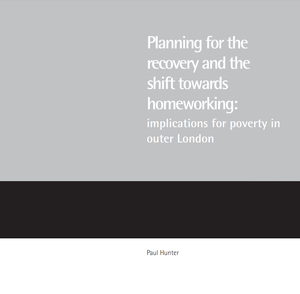What you need to know:
- Outer London has been just as badly affected as inner London in terms of COVID-19 death rates, furlough rates, unemployment, claimant count and reduced hours.
- The pandemic has disproportionately affected the poorest areas the most. The claimant rate in six outer London boroughs, for example, is over 10% - higher than any of the inner London boroughs.
- COVID-19 led to a significant shift to homeworking, with higher rates in London, especially Outer London, than the rest of the UK.
This report from The Smith Institute, funded by Trust for London, examines the short and long-term implications of COVID-19 on poverty and inequality in outer London, with a particular focus on employment, low pay, housing and the shift towards homeworking.
What does the report say about poverty in outer London?
- The report highlights the convergence in some poverty indicators between outer and inner London. It shows that the claimant count has increased at a faster rate in poorer outer London boroughs. The highest claimant rates in London are now in Ealing, Brent, Haringey, Waltham Forest, Newham and Barking & Dagenham.
- It shows how COVID-19 has had an uneven impact within outer London. The death rates in Haringey, Newham and Barking & Dagenham, for example, are four times higher than in Richmond upon Thames.
- Outer Londoners face an inhospitable labour market. Unemployment rates are higher than any UK region bar the North East. Outer Londoners are 25-50% more likely to be unemployed than those in inner London when accounting for personal characteristics; and approaching a quarter (23%) of jobs performed by outer Londoners are paid below the London Living Wage.
- Outer London young people have been affected most, with unemployment rates at around 25% for 16–24-year-olds. Disabled people and some ethnic minority groups have seen a rise in unemployment rates to above 10%.
- An increasing number of poorer households in outer London are now under acute housing stress. Outer London boroughs, for instance, have seen a large rise in housing support for those in the private rented sector, many of whom have rent arrears.
The report also examines the shift towards homeworking and shows:
- That COVID-19 has led to higher rates of homeworking in outer London than the rest of the UK. While higher paid Londoners are more likely to work from home this could have implications for where lower paid jobs are located and the demand for housing.
- This has major implications for poverty in outer London. Much will depend on whether people save up and consume when they do work in central London or if consumption patterns will be more localised to where people live and work.
- If there is a major shift towards homeworking, then there could more job opportunities locally for outer Londoners. The report shows that those in lower paid jobs work closer to where they live. More local jobs could therefore help combat efforts to tackle poverty.
- But there are risks associated with homeworking. The types of jobs could change, suggesting potential skills mismatches and higher rates of unemployment during the transition. Homeworkers could also trade proximity for space and move away from inner London, with knock-on effects on housing demand and costs in outer London.
The report recommends a package of measures to support outer London, including:
- The GLA sets up a special Outer London Covid Recovery Taskforce. This would give the boroughs a stronger voice and support their efforts to tackle poverty and maximise the benefits of the shift to homeworking.
- The GLA and boroughs should focus more on a wage-led recovery and make a concerted effort to improve the take-up of the London Living Wage.
- A sectoral approach in low paying sectors could make a difference, including making greater use of social clauses in procurement and commissioning.
- Boroughs should set out clear plans for their areas for an age of greater homeworking. Outer London boroughs should also have a clear set of metrics to assess the impact of homeworking on poverty.
- Greater support will be needed to help residents make the transition to homeworking, including access to suitable, low-cost workspace hubs.
- Delivering growth and tackling poverty in outer London will require extra funding, but also more devolved local and city-wide powers over rents and high street development.

13 July 2021